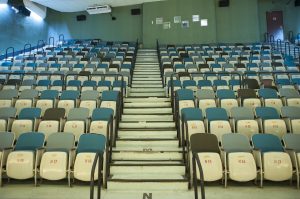RICE is the official media partner of Singapore International Film Festival 2019.
Remember the last time you sat through a horror movie and your instincts told you that a jump scare was coming, so you covered your eyes or looked away so you’d be less horrified by it?
Remember how, even though you could cover your eyes, you just couldn’t cover your ears to shield yourself from the scream echoing off the screen?
In a cinematic setting, the most power that we, as the audience, have on our viewing experience is through choosing what we see. We can block our eyes, look away, or identify the parts of the screen we want to focus on. No matter what, however, there is little to no control over our aural experience. It is therefore no surprise that sound is one of the most powerful tools in a director’s arsenal.
There are some common experiences of how sound is utilised in film. We associate sound design with the creation of an atmosphere that reflects the physical environment the characters are in; music and score heighten the emotional quality of a scene.
If we take this opening scene of Dunkirk as an example, we are cognisant of how the sound of gunshots, paper falling from the sky, and water droplets dripping recreates the wartime environment the characters are in, and how the music heightens the tense and uneasy mood of the scene. Even as the music elevates the emotions, it is the sound design that transports you into the situation.
Sound, essentially, immerses us in the atmosphere of the movie.
But surely, there’s more to sound than meets the ear? As a tool that has the most power over our experience, immersion is just one of its many uses.
What about sound’s evocative power? Apart from creating a physical landscape aurally, sound can be used to suggest what is unseen, whether a psychological state or even a memory.
Listen to this trailer. What do we hear?
But when we consider that the plot is about a Vietnamese protagonist living on Mars in the year 2045, who looks back at past footage of home, these sounds become an emotive experience of a memory.
The filmmaker argues that memory is often a product of narratives and the imagined within these stories. How are these indigenous subjects of the film so certain of their experience the first days after they are born into life in a cave? It is through the narratives told to them and what they imagine. Imagination, then, becomes a pivotal stimulus for memory.
In the same vein, does sound not function similarly in film? Sound serves as a stimulant for the audience to imagine life as the characters onscreen. It provides an access point to identify with the experiences and turmoils presented to us.
Imagine a movie that exposes how aspiring actresses are coerced into performing sexual acts or appearing nude just to attain a movie part. To have been put through such an ordeal would shape the very nature of your reality. Now picture this movie transforming the protagonist’s everyday life.
Every sound—every dumpling dropped into boiling water, every footstep on a hotel carpet, every breath from her male companions—becomes associated with a painful moment in the character’s memory. The filmmakers isolate these sounds within silence, amplifying the magnitude of every sound in order to force us to go through her painful experience. Hence, her psychological state is evoked.
This is Nina Wu.
Sound, as something unseen and invisible, parallels the forces converging around the characters. Ranging from story to story, these could be the threat of loss, a cultural mindset, or one’s experience of oppression. In Nina Wu, the threat of an oppressive media and entertainment industry looms, in The Tree House, the potential loss of the history of a marginalised group is exposed.
But what if the filmmaker is also able to use sound as an artistic means to challenge these forces? Art, with the ability to question our societal values, perceptions, and prejudices, remains one of the most powerful means of utilising the form. So let’s look at how Anthony Chen subverts our expectations in Wet Season.
There is a scene where a teacher and student are eating durian. Up to this point, we already sense some tension between them. So when the shot starts outside the classroom, with us seeing just windows and hearing what seems to be sounds of slurping, the film creates the impression of a possible sensual/sexual situation. But as the camera pans into the classroom, we realise that they are only eating durian. However, it is this experience of finding our assumptions contradicted that provide an opportunity to identify where the expectation can be located within our beliefs. It foreshadows how the trajectory of the film develops.
All this, of course, hinges on an audience’s ability to acknowledge that much of our own prejudices need to be challenged. Sound, then, is as powerful an artistic tool to subvert and challenge as words, visuals, and performance can be.
Just like the on-screen characters are powerless against the forces they persist against, we as the audience are powerless against the assault of sounds in a movie theatre. But similar to how these characters gain control over their plight by recognising the exact forces they have to work against, we could also become more cognisant of how sound works and affects our cinematic experience.
So the next time you find yourself in a horror movie and feeling powerless against the onslaught of jump scares and loud sounds, maybe you need not have to submit to the horrors. Maybe it could suffice to be mindful of how our position of less power is a consequence of certain artistic decisions. And to be conscious of how the powerful (whether in film production or in society) exercise their power over us is the first step to our choosing of how to respond to our situations.
All Rice readers enjoy S$2 off the opening film and S$1 off all other titles with the promo code SGIFFxRICE.






